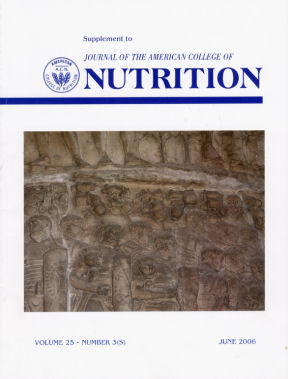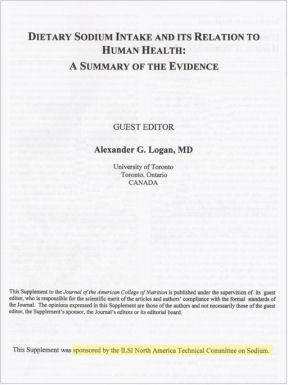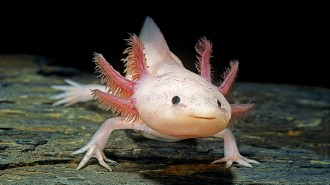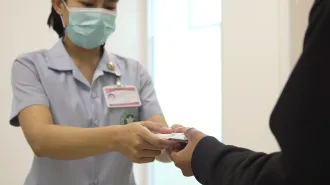A Salty Controversy over Sodium-and-Health Papers
The Center for Science in the Public Interest (CSPI) is a Washington, D.C.–based advocacy group. Through its newsletter, Nutrition Action, it reports on the latest findings on links between health and diet. The group has also launched crusades against processed foods and restaurant fare that’s high in total fat, trans fats, calories, or sodium.


More recently, the group launched a program called Integrity in Science, which issues a weekly report on possible conflicts of interest by government or public organizations. On Oct. 2, Integrity in Science attacked what it saw as signs of several conflicts of interest associated with a package of review papers that were published in the June Journal of the American College of Nutrition (JACN). Titled Dietary Sodium Intake and Its Relation to Human Health: A Summary of The Evidence, this supplement was funded by the International Life Sciences Institute (ILSI), a nonprofit foundation that describes itself as “a global network of scientists devoted to enhancing the scientific basis for public health decision-making.”
The seven papers in this supplement covered the influence of salt on blood pressure, cardiovascular disease, osteoporosis, and the body’s handling of the important mineral potassium. Overall, the link between high-salt intake and blood-pressure elevations—especially in certain salt-sensitive people—appears strong, according to the papers, but associations with other health effects were unclear or weak at best.
However, the papers point to a number of unanswered questions, not least of which is whether lowering salt intake “actually saves lives, reduces cardiovascular events, and improves quality of life,” as the supplement’s guest editor, Alexander G. Logan, puts it.
According to an Oct. 2 press release from CSPI, the journal made a number of blunders in its preparation of this supplement. Chief among them: It “failed to tell readers that [the] special supplement on salt intake was written and edited by consultants to the salt industry.”
Specifically, the release charged that:
- Most of the supplement’s articles “downplayed the risk of excessive salt consumption,” and “none of the pseudo-science in the supplement underwent peer review.”
- Editor Logan, a physician, is “a paid consultant to the salt industry. He also serves as scientific advisor to the sodium committee of the industry-backed ILSI, which funded the supplement.”
- Logan’s selection as guest editor was made by “ILSI’s sodium committee, which includes Frito-Lay, Heinz, Kraft, and Proctor & Gamble.” The problem with this, CSPI argued in a letter to the journal’s editor, is that these are “all companies that rely on the extensive use of salt to enhance the marketability of their products.”
- And several supplement articles “were written by past and current consultants to the Salt Institute, which is the industry’s lobbying arm.” Although it is the journal’s policy to identify industry ties to any authors, no article in this supplement contained such a disclosure.
In an attempt to substantiate those claims, Science News Online spoke with CSPI’s Integrity in Science staff, JACN‘s editor-in-chief, guest editor Logan, the head of ILSI North America, and the president of the Salt Institute. Those interviews paint a different and more nuanced picture than the CSPI press release does.
The journal did fail to publish disclosure statements on any industry links by authors of the supplement. However, JACN acknowledges that it never queried the individuals about such links—which means no author overtly hid any industry financing. Moreover, Logan is not a paid industry consultant, as was charged, and only one—not several—supplement articles were authored by a paid salt-industry consultant.
What the charges have done, however, is prompt JACN—and other publications—to review their policies for handling special supplements and to redouble their efforts to prominently identify in print any possible industry ties to supplement authors.
How it started
“CSPI is a nutrition group,” notes Merrill Goozner, director of the Integrity in Science project. He says that CSPI’s staff was disturbed that ILSI’s salt committee financed the supplement but didn’t disclose that group’s industry links.
Things “really went wrong,” he alleges, when the journal turned over complete control of the supplement to an outside editor whom an industry organization had handpicked. That editor chose which scientists would submit papers and served as sole referee of those papers.
Moreover, he charges, readers of the supplement had no way of knowing that articles in this supplement were not peer reviewed in the same way that the rest of the journal’s scientific content is.
On Oct. 2, Goozner sent a letter to James Marcetich of the National Library of Medicine, requesting that all articles from the supplement be withdrawn from the library’s index called MEDLINE. According to Goozner, the library’s guidelines state that supplements or other publications that have been funded in some fashion by private, for-profit organizations “will not be routinely indexed” in MEDLINE unless a thorough disclosure statement appears in each paper.
Marcetich didn’t return calls to his office for confirmation of this policy and word on whether the library would withdraw abstracts of the supplement papers, which were still in MEDLINE as of Oct. 19.
Also on Oct. 2, Integrity in Science coordinator Corrie Mauldin, who works for Goozner, sent a related letter to John J. Cunningham, editor-in-chief of the Journal of the American College of Nutrition. Mauldin wrote that she found it “surprising and disconcerting that an academic journal would allow the sponsor of a supplement to select the editor, especially one that is financially involved with the sponsor.” Mauldin continued, “No respectable journal should be renting out its name to the highest bidder and letting industry-funded groups hand pick ‘guest editors.'”
The letter pointed to three authors—physicians Suzanne Oparil of the University of Alabama at Birmingham, Michael H. Alderman of the Albert Einstein College of Medicine in New York City, and Robert P. Heaney of Creighton University in Omaha—as being industry consultants, the first two to the Salt Institute and the last to the dairy industry. Each of their articles in the supplement “emphasized the lack of literature and information [available] to inform a stricter policy on salt intake for the general population as a whole; a conclusion that greatly benefits large food producers,” Mauldin charged.
None of these authors’ ties to industry was disclosed in print, something that even the journal’s editor confirmed to Science News Online is a violation of its policy.
In light of these problems, Mauldin wrote, CSPI is asking for “a formal apology and correction in JACN‘s next issue. … We also ask that you inform the National Library of Medicine about these lapses and ask that the supplement’s articles be withdrawn from MEDLINE.”
Moreover, she observed, none of the papers in the supplement underwent the journal’s normal peer-review process. She recommended to JACN “that you adopt peer review guidelines for your paid supplements that are no different than those currently in place for the main part of the journal.” Finally, she requested that Cunningham “ban those authors who failed to disclose to you their conflicts of interest from publishing in your journal for at least 3 years.” That, she maintains, would match the policy in at least one other journal, Environmental Health Perspectives.
The charged respond
Guest-editor Logan agrees that CSPI’s charges are substantial and would be serious—if true. He says that he is disheartened that CSPI didn’t double-check its facts before going to the media. But he says that the group’s staff never contacted his office. “Perhaps if they had,” he says, “CSPI might have published my affiliation correctly.” He’s a nephrologist with Mt. Sinai Hospital in Toronto—not New York City.
Asked about the charge that he was a paid consultant to the salt industry, he says: “That’s absolutely false. I’ve never taken money from any industry group.” The reason, he says, is that such a link might “taint” his reputation for quality research and objectivity.
Bob Fisher, executive director of ILSI North America confirms that his group never paid Logan “for anything.”
Richard L. Hanneman, president of the Salt Institute, reports that “we have picked up his [Logan’s] travel expenses” when he flew out to share his expertise in talks at the institute’s meetings. That’s standard business practice, he notes, since organizations can’t expect a featured speaker to finance his own participation in a meeting from which he will derive no personal benefit.
More important to CSPI’s charges, Hanneman adds, “We do not pay Logan a consulting fee.” He has never even accepted an honorarium to speak, says Hanneman.
As further evidence of Logan’s potential bias, CSPI points out that he is listed on ILSI’s Web site as a consultant to its sodium committee.
According to Logan, “While I provide scientific advice to the organization, I receive no financial or other compensation from them. I made that a stipulation in the legal contract that I signed with them several years ago.”
In fact, he notes, “My involvement with ILSI began at the time that the Institute of Medicine [IOM] was beginning to review the issue of sodium. ILSI was a contributor to this review process. Apart from [its] financial contribution, [ILSI] prepared a list of relevant publications. They [ILSI] asked my advice as to whether the list was complete. It was during this process of review that I recognized the need for a supplement aimed at physicians particularly, knowing that the focus of the IOM was broader. This set the groundwork for my continued involvement in ILSI”—and guest editorship of the disputed supplement.
Once he accepted the assignment, Logan says, “I was solely responsible; they [ILSI] didn’t have any input in it, nor did anyone else from the salt industry.” The supplement’s authors were selected solely “because of their scientific excellence and knowledge of the assigned topic,” he maintains.
When the papers were completed, Logan edited them all, then sent all authors the entire package and solicited critiques of each paper. Logan said he made sure that all criticisms of a paper that emerged were addressed by its author(s) before signing off on them. In addition, another outside, nonindustry reviewer—one associated with another journal—read and critiqued each paper for content and balance.
Finally, as to why no statement disclosing any conflict of interest was included in the published supplement, Logan notes that JACN never requested any. He notes that some journals do and others don’t request that authors of reports sign disclosure statements. “I’m not in the business of making journal policy,” Logan told Science News Online, so if JACN didn’t ask for such statements, he saw no reason to produce them. “But if they had asked for it, that information would have been provided,” he says.
As Logan sees it, he fulfilled an academic service, not a for-profit assignment. He says he’s confused as to why CSPI would launch a “personal attack” against him and his efforts. “I feel ambushed.”
What about the other researchers who published in Logan’s supplement? Says Hanneman of the Salt Institute, “We’ve given Susanne [Oparil] some consulting fees over the years . . . never more than $3,000 a year. It was usually where we wanted 2 or 3 days of her time.” He adds, “We picked up travel expenses for Bob [Heaney] to come to a meeting—just one time.”
Science News Online reached supplement contributor Alderman by e-mail in Japan, where he was giving the presidential address “Salt, blood pressure, and cardiovascular disease” at the biennial scientific meeting of the International Society of Hypertension. “These peers would hardly have elected me president had they thought that my scientific work was not credible, and they certainly would not have invited me to present the keynote talk at this meeting attended by so many of the world’s leaders in blood pressure–related science,” he says.
The basis of CSPI’s charges against him, Alderman says, is that more than a decade ago, “I published research findings that questioned the value of a low-sodium diet. The Salt Institute apparently saw this study and invited me to attend their consultant meeting. I did and believe I received an honorarium. Having been thereafter accused of being a shill for the Salt Institute, when asked to attend subsequent annual consultant meetings, I refused any compensation. Neither I, nor my collaborators, nor my family, have ever received any research support, speaking compensation, nor do we have any financial interest in anything related to salt or the food industry,” he says.
“It bothers me,” he says, “that CSPI manages, somehow, to make my integrity the issue, rather than undertake a reasoned discussion of the scientific issues I and others have raised. Presumably, we all share a commitment to human health and well-being. It is certainly not helpful to discourage dissent based upon evidence publicly displayed in the medical literature—and open to refutation—because some group finds it inconvenient.”
CSPI responds
CSPI now acknowledges it made a few errors: principally Logan’s affiliation and its charge that he was a paid consultant.
However, Goozner argues that because Logan allowed his name to appear on the Salt Institute’s Web site as an advisor, he must be viewed as a consultant. This link had suggested to CSPI that Logan was paid—something that Goozner says his organization never confirmed. When informed by Science News Online about the statement by Logan, the Salt Institute, and ILSI that no money changed hands, Goozner now says, “We overreached with the word paid.” Indeed, he said, “I made a mistake” and “apologize for my error to Dr. Logan.”
In CSPI’s Oct. 2 press release, Goozner charged that the supplement’s contents consisted of pseudoscience. Asked to explain, Goozner responded with the question: “If it’s not peer reviewed, is it science?” Peer review is the common means by which journals evaluate the quality of research reports. To his mind, Goozner said, anything not peer reviewed is not real science.
However, Goozner charges, for the journal to have ceded control of the sodium-and-health supplement to even an unpaid consultant of ILSI’s Technical Committee on Sodium—which includes manufacturers of foods heavy with salt—calls into question the objectivity of the opinions of authors in that supplement. That’s especially true, he argues, since a number of the authors have ties to industry. Heaney, for instance, has previously reported receiving funding from the dairy industry.
Goozner gave Alderman as another example. Although Alderman may not have accepted money from the salt industry, the physician did acknowledge he has attended consultant meetings convened by industry.
In fact, Alderman says that the salt industry “asked my advice and I gave it at several annual meetings over the past 7 or 8 years. I would assume that qualifies me as a consultant.”
Broader repercussions
Cunningham, deputy provost of the University of Massachusetts, was recently named JACN‘s editor in chief. Since the controversy began 3 weeks ago, he has been reviewing what happened and now concludes that the journal’s supplement-production process “was flawed.” He says that changes for guest-edited supplements are on the way.
It is already JACN‘s policy to ask authors of original-research articles to disclose any potential conflicts of interest. Where such potential conflicts are identified, the published manuscript cites them. That should also have happened here, Cunningham says.
Although a guest editor must agree to follow the journal’s policies, Cunningham concedes that “we were a little lax” in making sure that Logan understood the expectation that he would collect such disclosures from the supplement’s authors and forward them to the journal’s editorial office. In future, Cunningham pledged, a call for written disclosures from each author will be explicitly made to guest editors.
In the interim, Cunningham e-mailed every author of the June salt supplement within days of the CSPI charges going public. He now reports that with answers in from everyone except Oparil so far, none of the other authors or Logan had financial ties to ILSI or the salt industry. That information will be passed along to MEDLINE, he says.
“I think I need to put some of this information out to our readership . . . : what the process was, what the shortcomings were, what I have found out about the authors in terms of disclosure, and how we’re going forward to minimize [the chance this could happen again],” says Cunningham. At present, he’s not sure how that information will be relayed.
As for banning the contested supplement’s authors from publishing in the journal for the next few years, Cunningham doesn’t foresee that happening unless he gets confirmation that any “indeed were paid industry representatives.”
The editor acknowledges that papers in the supplement underwent less scrutiny than most in the regular journal do. Cunningham notes that the supplement offerings were reviews of already published research. As such, the authors were only offering their expert interpretation of previously vetted data, “and it’s hard to peer review someone’s perspective.” Indeed, he notes, for the same reason, “even in our own main journal, an invited review gets less rigorous peer review than an article offering original research.”
Finally, as to the charge that the supplement published pseudoscience, Cunningham says he has yet to learn directly from CSPI what it meant by that remark, because “all I see is real science in the [supplement’s] articles.” However, he adds, “I told Corrie Mauldin I’d be happy to see a manuscript from them [CSPI] or a review of their perspective” on the published sodium-and-health literature.
JACN is hardly the only nutrition journal that issues periodic thematic supplements. Two others are the American Journal of Clinical Nutrition and the Journal of Nutrition, both published by the American Society of Nutrition. Each has taken somewhat different approaches to ensuring the quality of its supplements, notes Karen M. King, the society’s communications director.
For instance, she notes, papers to be published within supplements of the American Journal of Clinical Nutrition “go through the [journal’s] editorial office and are [peer] reviewed in exactly the same way as all other manuscripts submitted to the journal.”
For supplements to the Journal of Nutrition, however, “we allow guest editors to handle the peer review.” Those editors “must submit a conflict-of-interest disclosure form at the time that the supplement proposal is made to our organization,” she says. If those forms suggest a possible “imbalance,” she says that the journal may then require that an additional editor be recruited, “someone who is not affiliated with the sponsoring organization in any way.”
In addition, both journals request that every author report any potential conflict of interest. These are then printed on the title page of the ensuing supplement and again on papers within it.
However, King says, as a result of the new brouhaha over JACN‘s salt supplement, her society will be tightening disclosure policies even further. “As a result of this new [charge by CSPI against JACN], we’re now thinking about preparing a conflict-of-interest disclosure form and asking every author to fill it out and sign it.” At a minimum, she says, it will ensure that an author hasn’t missed the request for conflict-of-interest information in the manuscript-preparation guidelines.
In addition, the Journal of Nutrition is in the process of implementing a new review process for papers in its supplements. Beginning soon, King says, all papers will have to be reviewed by the journal’s in-house editors in addition to the guest editor.
Even the National Library of Medicine is reacting to the JACN incident, according to CSPI’s Mauldin. In an e-mailed announcement on Oct. 10, she noted that MEDLINE’s policy prohibits indexing supplements by “private, for-profit” organizations. That prohibition wouldn’t affect the salt supplement, she notes, because ILSI is a nonprofit group.
On Oct. 13, the National Library of Medicine’s communications director, Bob Mehnert, confirmed that the library will be revising its indexing policy for journal supplements. Details, still in flux, should be published by early December and implemented in time for the indexing of 2007 publications, he says.
At a minimum, Mehnert told Science News Online, the policy “will state that supplements that indicate sponsorship or funding derived from any organization will not be routinely indexed for MEDLINE unless certain conditions are met. A disclosure statement should be included within the text of each article that might be cited for MEDLINE, preferably on the title page of the article, indicating any financial relationship that each author has with the funding source and with any product discussed or implied in the text of the article.”
Logan says he actually applauds CSPI’s intent—to ferret out evidence of possible hidden bias in researchers. He however wishes the group had employed more rigorous research methods in its own investigations before publicizing its charges against him, JACN, and the other supplement authors.
If you would like to comment on this article, go the Food for Thought blog.







